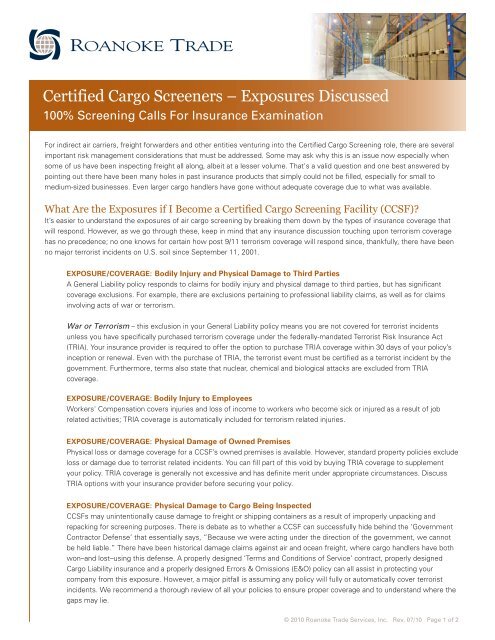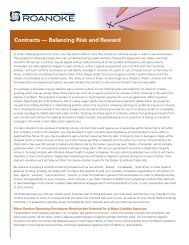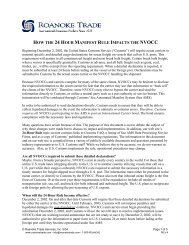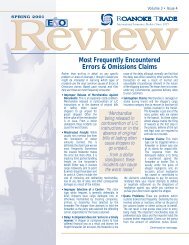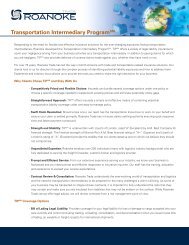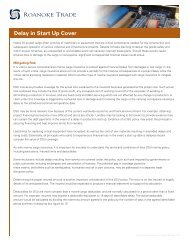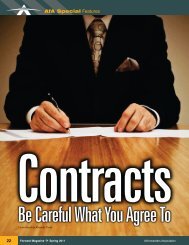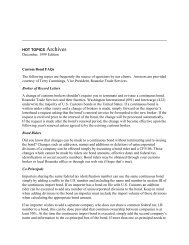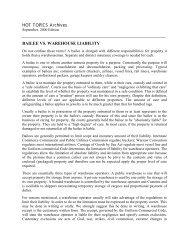100381 Certified Cargo Screeners front - Roanoke Trade Services ...
100381 Certified Cargo Screeners front - Roanoke Trade Services ...
100381 Certified Cargo Screeners front - Roanoke Trade Services ...
Create successful ePaper yourself
Turn your PDF publications into a flip-book with our unique Google optimized e-Paper software.
<strong>Certified</strong> <strong>Cargo</strong> <strong>Screeners</strong> – Exposures Discussed<br />
100% Screening Calls For Insurance Examination<br />
For indirect air carriers, freight forwarders and other entities venturing into the <strong>Certified</strong> <strong>Cargo</strong> Screening role, there are several<br />
important risk management considerations that must be addressed. Some may ask why this is an issue now especially when<br />
some of us have been inspecting freight all along, albeit at a lesser volume. That's a valid question and one best answered by<br />
pointing out there have been many holes in past insurance products that simply could not be filled, especially for small to<br />
medium-sized businesses. Even larger cargo handlers have gone without adequate coverage due to what was available.<br />
What Are the Exposures if I Become a <strong>Certified</strong> <strong>Cargo</strong> Screening Facility (CCSF)?<br />
It’s easier to understand the exposures of air cargo screening by breaking them down by the types of insurance coverage that<br />
will respond. However, as we go through these, keep in mind that any insurance discussion touching upon terrorism coverage<br />
has no precedence; no one knows for certain how post 9/11 terrorism coverage will respond since, thankfully, there have been<br />
no major terrorist incidents on U.S. soil since September 11, 2001.<br />
EXPOSURE/COVERAGE: Bodily Injury and Physical Damage to Third Parties<br />
A General Liability policy responds to claims for bodily injury and physical damage to third parties, but has significant<br />
coverage exclusions. For example, there are exclusions pertaining to professional liability claims, as well as for claims<br />
involving acts of war or terrorism.<br />
War or Terrorism – this exclusion in your General Liability policy means you are not covered for terrorist incidents<br />
unless you have specifically purchased terrorism coverage under the federally-mandated Terrorist Risk Insurance Act<br />
(TRIA). Your insurance provider is required to offer the option to purchase TRIA coverage within 30 days of your policy’s<br />
inception or renewal. Even with the purchase of TRIA, the terrorist event must be certified as a terrorist incident by the<br />
government. Furthermore, terms also state that nuclear, chemical and biological attacks are excluded from TRIA<br />
coverage.<br />
EXPOSURE/COVERAGE: Bodily Injury to Employees<br />
Workers' Compensation covers injuries and loss of income to workers who become sick or injured as a result of job<br />
related activities; TRIA coverage is automatically included for terrorism related injuries.<br />
EXPOSURE/COVERAGE: Physical Damage of Owned Premises<br />
Physical loss or damage coverage for a CCSF’s owned premises is available. However, standard property policies exclude<br />
loss or damage due to terrorist related incidents. You can fill part of this void by buying TRIA coverage to supplement<br />
your policy. TRIA coverage is generally not excessive and has definite merit under appropriate circumstances. Discuss<br />
TRIA options with your insurance provider before securing your policy.<br />
EXPOSURE/COVERAGE: Physical Damage to <strong>Cargo</strong> Being Inspected<br />
CCSFs may unintentionally cause damage to freight or shipping containers as a result of improperly unpacking and<br />
repacking for screening purposes. There is debate as to whether a CCSF can successfully hide behind the ‘Government<br />
Contractor Defense’ that essentially says, “Because we were acting under the direction of the government, we cannot<br />
be held liable.” There have been historical damage claims against air and ocean freight, where cargo handlers have both<br />
won–and lost–using this defense. A properly designed ‘Terms and Conditions of Service’ contract, properly designed<br />
<strong>Cargo</strong> Liability insurance and a properly designed Errors & Omissions (E&O) policy can all assist in protecting your<br />
company from this exposure. However, a major pitfall is assuming any policy will fully or automatically cover terrorist<br />
incidents. We recommend a thorough review of all your policies to ensure proper coverage and to understand where the<br />
gaps may lie.<br />
© 2010 <strong>Roanoke</strong> <strong>Trade</strong> <strong>Services</strong>, Inc. Rev. 07/10 Page 1 of 2
EXPOSURE/COVERAGE: Professional Liability (E&O) including Consequential Damages<br />
Professional Liability – this exclusion in your General Liability (GL) policy typically means that your insurance does not apply<br />
to claims rising out of the rendering or failure to render any professional service, as those exposures are expected to be<br />
insured under a separate E&O policy. ‘Professional services’ can be considered as any activity from which you derive income<br />
or any services provided to your customer base. In the case of an explosive detonating before the goods have been<br />
inspected, there is potentially GL coverage, assuming the explosive was not purposely set as part of a terrorist threat or plot.<br />
However, if that same explosive detonates after the CCSF inspected the goods and failed to detect it, there may not be<br />
coverage under a GL policy if it is determined that the incident should have been covered under an E&O policy. (Note: While<br />
E&O insurance provides coverage for property damage and consequential losses, it does not provide coverage for claims<br />
involving death or bodily injury.)<br />
Consequential damages are financial losses suffered over and above freight costs, such as lost profits or the costs of delay,<br />
which may include:<br />
• Your screening obtains a false positive and your customer's goods are detained by a U.S. government agency. This may<br />
prompt your customer to look to you for recovery of losses suffered as a result of the cargo being held and delayed.<br />
• Your screening obtains a false positive that requires authorities to further examine your customer's cargo and in the<br />
process the cargo becomes damaged, or the consignee simply rejects the freight because of visible signs of package<br />
tampering from the inspection. This may also prompt your customer to look to you for recovery.<br />
Consequential Damages are another exposure that may be minimized using a properly designed ‘Terms and Conditions of<br />
Service’ contract. Properly designed E&O coverage is also important to protect CCSFs from this exposure. As is the case<br />
with GL, E&O insurance does not automatically provide coverage for terrorist incidents. Once again, purchasing TRIA<br />
coverage with your E&O policy is something to consider.<br />
The SAFETY Act – Liability Exposure Assistance<br />
While the Transportation Security Administration (TSA) is charged with directly overseeing the CCSP, the Department of Homeland<br />
Security (DHS) is encouraging cargo handlers to become CCSFs by offering a program to minimize their exposure. The DHS Support<br />
Anti-Terrorism by Fostering Effective Technologies Act of 2002 (SAFETY Act) is essentially a program designed to cap the liability of<br />
developers and users of anti-terrorism technology.<br />
Anti-terrorism technology developers and users who wish to participate in the SAFETY Act program in order to cap their limit of<br />
liability must secure the minimum levels of insurance required by DHS. The level of insurance required is currently being determined<br />
on a case-by-case basis.<br />
In addition, DHS requires SAFETY Act program participants to purchase TRIA coverage as part of their GL and umbrella policies.<br />
While most insurance companies are required to offer TRIA coverage at the time of purchasing a new or renewal policy, they are not<br />
obligated to offer the coverage mid-term if the initial offer is declined. Therefore, remember to consider the TRIA coverage option<br />
carefully at the inception or renewal of your policies.<br />
Many shippers are using the SAFETY Act as a benchmark in the selection of third party screeners and may not sub-contract the<br />
screening operations unless the CCSF is SAFETY Act certified. <strong>Roanoke</strong> <strong>Trade</strong> can assist with your SAFETY Act application process<br />
and allow you to save time and money in the process.<br />
Risk Management Planning for those Interested in Becoming a CCSF<br />
If you’re considering becoming a CCSF, you will inevitably need to re-think exposures and examine your insurance coverage as part<br />
of your overall management and planning. While this task may seem confusing and overwhelming, working with an insurance<br />
provider current on these and other critical trade issues affecting your industry can make a difference in your company’s long-term<br />
success. <strong>Roanoke</strong> <strong>Trade</strong> has assisted the majority of current CCSP companies and helped many of them achieve SAFETY Act<br />
certification. We are prepared to deliver cost effective solutions to your company as well.<br />
This information is provided by <strong>Roanoke</strong> <strong>Trade</strong> <strong>Services</strong>, Inc. as a public service and for discussion of the subject in general. It is not to be construed as legal advice.<br />
Readers are urged to seek professional guidance from appropriate parties on all matters mentioned above. Insurance and surety risk management solutions for supply<br />
chains and transportation have been <strong>Roanoke</strong> <strong>Trade</strong>’s focus since 1935. <strong>Roanoke</strong> <strong>Trade</strong> is a member of Munich Re and an affiliate of Watkins Underwriters at Lloyd's<br />
of London. <strong>Roanoke</strong> <strong>Trade</strong> closely follows the ever-changing government policies that affect the movement of goods, and works only with insurance companies<br />
financially rated as “A-” (Excellent) or better.<br />
For more information, please contact us at 1-800-ROANOKE, ext. 1252 or info@roanoketrade.com<br />
© 2010 <strong>Roanoke</strong> <strong>Trade</strong> <strong>Services</strong>, Inc. Rev. 07/10 Page 2 of 2


